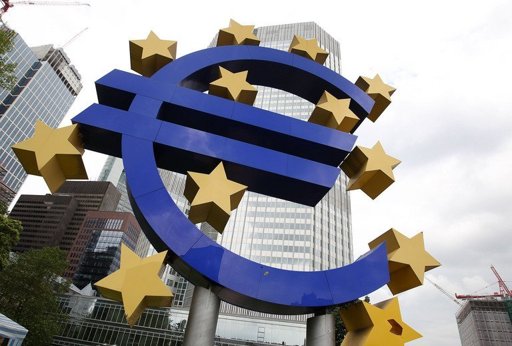The eurozone finally escaped on Wednesday a crippling 18-month recession which has cost millions of jobs and tested the single currency to the limit but deep doubts cloud the outlook.
The European Commission was quick to warn that tough structural reforms, including unpopular austerity policies, must be pursued without let-up if the recovery is to last.
"There is still a very long way to go before we reach our ultimate goal of sustainable growth model that delivers more jobs," said EU Economic Affairs Commissioner Olli Rehn."
The 17-country eurozone, home to about 340 million people, grew 0.3 percent in the three months to June, topping analyst forecasts for 0.2 percent.
In the first quarter, the economy had shrunk 0.3 percent, extending the recession -- defined as two consecutive negative reports -- into a record sixth quarter.
The data, widely anticipated, left stocks unimpressed and the euro weaker.
Behind the headline gains, other figures showed how much ground still needs to be made up -- the eurozone contracted 0.7 percent compared with second quarter of 2012, the Eurostat statistics agency said.
Analysts expect the economy to shrink by around 0.5 percent for full-year 2013, slightly worse than the Commission's 0.4 percent, followed by a modest expansion next year.
"A sustained recovery is now within reach but only if we persevere on all fronts of our crisis response," Rehn said.
Eurozone states must "keep up the pace of economic reform, regain control over our mountain of debt ... and build the pillars of a genuine economic and monetary union with no loopholes where irresponsible bankers or short-sighted policy makers can thrive," he warned.
In Germany, which faces polls in September, Chancellor Angela Merkel has made a virtue out of the need for austerity as an essential foundation for a return to growth.
France, however, has led calls to put the emphasis on growth and jobs, with the EU seeking to find a difficult middle ground between the two.
The data showed that Germany, Europe's powerhouse economy, grew 0.7 percent, while France expanded 0.5 percent, way ahead of forecasts for just 0.2 percent.
The French figures were the best since first quarter 2011 and significant given how the eurozone's second-ranked economy has struggled for momentum, burdened with heavy debt and an increasingly uncompetitive export sector.
Analysts were positive on the figures but cautious on the outlook -- the eurozone may be returning to growth but its performance is anaemic compared with other major economies and the debt crisis refuses to go away.
Unemployment too remains at a record high 12.1 percent and lurking in the background are concerns the debt rescue programme for twice bailed-out Greece could unravel.
Jonathan Loynes of Capital Economics said Germany did slightly better than expected and France surprised but he the Netherlands fell 0.2 percent while Spain and Italy continued weak.
The "indebted countries of the periphery are still mainly in recession and a very long way from the rates of expansion needed even to begin to eat into their enormous debt burdens," Loynes noted.
"The eurozone's recession may be over -- for now at least -- but the debt crisis in the periphery is decidedly not," he said.
For Tom Rogers, senior economic adviser at EY Eurozone Forecast, the north-south divide remains a key concern, "potentially undermining efforts to deliver eurozone-wide solutions and further pressurising national governments."
Equally worrying, the pace of recovery in the strongest economies "is unlikely to be sustained in the second half of the year," Rogers said.
"More needs to be done if the apparent recovery of the past few months is to be more than simply a bright spot in an otherwise difficult few years."
Berenberg Bank economist Christian Schulz highlighted weak investment in France, suggesting that its rebound "does not signal a return to persistent strong growth yet."
Other figures showed that the full 27-member EU grew 0.3 percent in the second quarter compared with the first when it shrank 0.1 percent.
Among non-euro members, Britain grew 0.6 percent, confirming recent stronger indicators.
Comparable figures for the United States and Japan came in at 0.4 percent and 0.6 percent, respectively.


















































